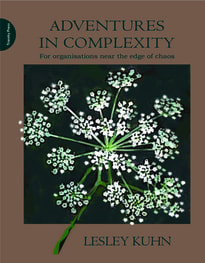|
List Price: £20.00 use code to save 20%
Format: Paperback, 146 pages Size: 17 x 24.4 cm ISBN: 978-0-9562631-0-0 Tags: Complexity Theory Save 20%
on the list price when you buy direct from us. Use code tpdirect at checkout for a 20% discount. Buy the paperback (£20)
|
Adventures in Complexity
|
Read more:ReadershipFor leaders, managers, and everyone who works in or for an organisation, here at last is a straight-forward and immediately practical way of applying what may seem like a complicated theory.
For academics, researchers and students who may be theorising in a vacuum, this is a much-needed book to show how complexity theory can be translated into the workplace. |

